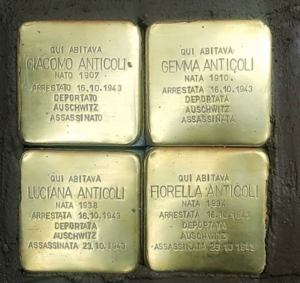HOLOCAUST REMEMBRANCE -Stolpersteine for the Anticoli family and a conference on destroyed culture
 Giacomo Anticoli was born into an old and large Jewish family in Rome. In 1928 he was hired as a driver and head usher at the Italian Ministry of National Education, and then was relocated to the Italian National Research Council (CNR). From 1937 he resided inside the building with his loved ones, in the service apartment reserved for ushers. A short time later, however, he lost his housing, along with his job. After the proclamation of the racial laws, some family members residing on Via Ippolito Nievo took in the Anticolis – Giacomo with his wife Gemma and their little daughters Fiorella and Luciana, born a few months earlier – who had no more income nor roof over their heads. The Nazi-Fascists captured them at dawn on October 16, 1943, and deported them to Auschwitz-Birkenau. None of the family members returned to Rome.
Giacomo Anticoli was born into an old and large Jewish family in Rome. In 1928 he was hired as a driver and head usher at the Italian Ministry of National Education, and then was relocated to the Italian National Research Council (CNR). From 1937 he resided inside the building with his loved ones, in the service apartment reserved for ushers. A short time later, however, he lost his housing, along with his job. After the proclamation of the racial laws, some family members residing on Via Ippolito Nievo took in the Anticolis – Giacomo with his wife Gemma and their little daughters Fiorella and Luciana, born a few months earlier – who had no more income nor roof over their heads. The Nazi-Fascists captured them at dawn on October 16, 1943, and deported them to Auschwitz-Birkenau. None of the family members returned to Rome.
The names of the four members of the Anticoli family are engraved in just as many Stolpersteine installed today in front of the CNR headquarters in Piazzale Aldo Moro. This act accompanies other moments of remembrance and reflection, starting with the “Science and Remembrance” conference that took place shortly afterwards with speeches by representatives of the institutions, the scientific community, and the Jewish world. The initiative was held exactly one year after the signing of an agreement between research institutions and Jewish entities aimed at collecting and disclosing testimonies and documents “capable of outlining the impact of racial laws.”
This project involves other Italian institutions, in addition to the CNR, such as the National Institute of Geophysics and Volcanology, the Accademia Nazionale dei Lincei, the Union of the Italian Jewish Communities, the Jewish Community of Rome and the National Institute for the Analysis of Public Policies. This is the context in which the “Remembrance Page” operates, curated online by physicist Aldo Winkler, who introduced the project at CNR. The website has a “special focus on women, whose involvement in studies and academic life in Jewish society was very much in the forefront of the customs of the time,” the scholar pointed out. Another goal is “to highlight the irreversible damage done to the Italian culture, for which we are still paying the consequences, entailed by the cancellation of prestigious scientific and cultural schools.”
Translated by Klara Mattiussi, student from the Advanced School for Interpreters and Translators of the University of Trieste, trainees in the newsroom of the Union of the Italian Jewish Communities – Pagine Ebraiche.
